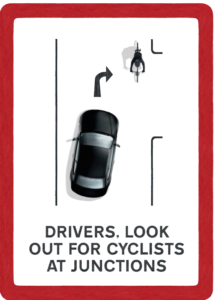

Leaflets
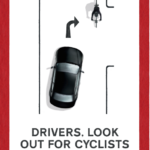
Junctions
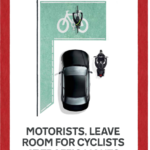
Traffic lights
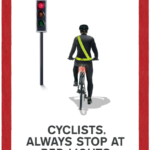
Red lights
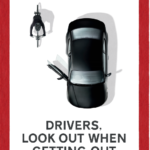
Getting out
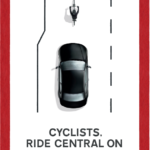
Narrow roads
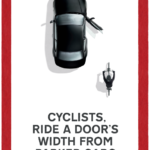
Parked cars
The number of people choosing to cycle for fun, fitness or to get to work has increased by more than a quarter in the last twenty years. An incredible 3.2 billion miles are cycled on our roads every year.
The aim of THINK!’s latest campaign is to raise cyclists’ awareness of the dangers of lorries turning left – the area where a third of collisions between cyclists and lorries happen.
We want to remind cyclists to ‘hang back’ at junctions to avoid getting caught between a lorry and left hand turn.
THINK! has also teamed up with the Freight Transport Association to remind HGV drivers to look out for cyclists.
The facts
- Between 2004 and 2020, serious injuries (adjusted) rose by 26% and pedal cycle traffic grew by 96%*
- 141 cyclists were killed and 4,215 seriously injured on our roads in 2020.
- 92 cyclists were killed in accidents involving HGVs between 2015 and 2020 (14% of all pedal cycle fatalities)
*The stats for 2020 are slightly skewed due to events of the pandemic. We saw overall road casualty figures were lower due to a reduction in traffic during the pandemic, but for pedal cycling the opposite pattern was true as there was more pedal cycle traffic and therefore more casualties.
The law
The following are offences for which people cycling in Great Britain can be prosecuted:
- Dangerous Cycling: “Dangerous” refers to danger either of injury to any person or of serious damage to property. Demonstrated by cycling on a road in a way that falls far below what would be expected of a competent and careful cyclist.
- Careless, and inconsiderate, cycling: Demonstrated by cycling on a road without due care and attention, or without reasonable consideration for other persons using the road.
- Cycling when under influence of drink or drugs: Cycling on a road or other public place while unfit to ride through drink or drugs (that is to such an extent as to be incapable of having proper control of the cycle).
- Wanton or furious racing or driving: Causing harm to any person as a result of wanton or furious driving or racing, or other wilful misconduct, or by wilful neglect.
- Unauthorised cycle racing on public highways: promoting or taking part in a race or trial of speed between cycles on a public way which is either unauthorised or which does not comply with conditions imposed in respect of the event.
- Riding an Electrically assisted pedal cycle under the age of 14: This is an offence on a road.
- Cycling on a pavement.
People driving in Great Britain can be prosecuted where their actions harm or risk harming cyclists and other road users. Relevant offences include:
- Dangerous driving: “Dangerous” refers to danger either of injury to any person or of serious damage to property on a road or other public place.It is an offence if the driving style is dangerous, or where danger arises from the state of the vehicle.
- Causing death by dangerous driving: Causing the death of another person while driving dangerously on a road or other public place.
- Careless and inconsiderate driving: Driving without due care and attention, or without reasonable consideration for other persons using the road or public place.
- Causing death by careless, or inconsiderate driving: Causing the death of another person while driving without due care and attention, or without reasonable consideration for other persons on a road or other public place.
- Driving under the influence of drink or drugs: Driving or attempting to drive on a road or other public place, while unfit to drive through drink or drugs.
- Driving or being in charge of a vehicle with alcohol concentration above prescribed limit: Driving or attempting to drive, or being in charge of a vehicle, on a road or other public place, after consuming so much alcohol that the proportion of it in the person’s breath, blood or urine is above the legal limit.
- Causing death by careless driving under the influence of drink or drugs: Causing the death of another person while driving on a road or other public place without due care and attention, or without reasonable consideration for other persons using the road or place, when the driver is unfit to drive through drink or drugs, has consumed so much alcohol that the proportion of it in his breath, blood or urine is above the legal limit, or there is a specified controlled drug in his body and the proportion of it in his blood or urine exceeds the specified limit for that drug.
This offence can also be committed by the driver refusing, without reasonable excuse, to provide a specimen of breath, blood or urine when required to do so within 18 hours of the time when he is driving, or by refusing to give his permission for a laboratory test of a specimen of blood, where required to do so by a constable, without reasonable excuse.
- Failing to stop after an accident or failing to report an accident: Where a driver is involved in an accident on a road or other public place which causes personal injury or property damage and does not stop and provide their name and address and also the name and address of the owner and identification marks of the vehicle to any person reasonably requiring that information, or if not required to provide that information, fails to report the accident.
- Breach of requirements as to control of vehicle, mobile telephones etc: This includes driving while using a hand-held mobile telephone or other hand-held interactive communication device.
The maximum penalty for causing death by dangerous driving, and for causing death by careless driving under the influence of drink or drugs is life in prison, with a minimum driving ban of five years.
Further detail on penalties for cycling and driving offences can be found here: The Highway Code – Annex 5. Penalties – Guidance – GOV.UK (www.gov.uk)
Operation Close Pass
Operation Close Pass is being carried out by selected police forces across the UK to educate drivers on the safe passing distances when overtaking cyclists. The operation places a focus on education rather than enforcement, with in the moment education being offered to offending drivers. If drivers refuse this offer, they are typically issued with a Traffic Offence Report.